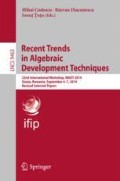Abstract
The present paper sets the foundation of logic programming in hybridised logics. The basic logic programming semantic concepts such as query and solutions, and the fundamental results such as the existence of initial models and Herbrand’s theorem, are developed over a very general hybrid logical system. We employ the hybridisation process proposed by Diaconescu over an arbitrary logical system captured as an institution to define the logic programming framework.
Notes
- 1.
A category \(\mathcal{C}\) is a broad subcategory of \(\mathcal{C}'\) if \(\mathcal{C}\) is a subcategory of \(\mathcal{C}'\) and \(\mathcal{C}\) contains all objects of \(\mathcal{C}'\), i.e. \(|\mathcal{C}|=|\mathcal{C}'|\).
- 2.
For all \(M'\in |{\mathbb Mod}(\varSigma ')|\) and \(M_1\in |Mod(\varSigma _1)|\) such that \(M'\!\upharpoonright \!_\chi =M_1\!\upharpoonright \!_\varphi \) there exists \(M_1'\in |{\mathbb Mod}(\varSigma _1')|\) such that \(M_1'\!\upharpoonright \!_{\varphi [\chi ]}=M'\) and \(M'_1\!\upharpoonright \!_{\chi (\varphi )}=M_1\).
- 3.
\(h^{mod}\) is a |R|-indexed family of \(\varSigma \)-homomorphisms \(h^{mod}=\{h^{mod}_s:\mathcal{M}_s\rightarrow \mathcal{M}'_{h^{st}(s)}\}_{s\in |R|}\).
- 4.
A category \(\mathcal{C}\) is a full subcategory of \(\mathcal{C}'\) if \(\mathcal{C}\) is a subcategory of \(\mathcal{C}'\) and for all objects \(A,B\in |C|\) we have \(\mathcal{C}(A,B)=\mathcal{C}'(A,B)\).
- 5.
We denote by \(\rho [j\leftarrow k]\) the sentence \(\varphi (\rho )\), where the signature morphism \(\varphi :(\varSigma ,Nom\cup \{j\},\varLambda )\rightarrow (\varSigma ,Nom,\varLambda )\) is the canonical extension of the function \(\varphi _{\mathbb Nom}:\{j\}\rightarrow Nom\) defined by \(\varphi _{\mathbb Nom}(j)=k\).
- 6.
This condition implies that there exists a basic model \((\mathcal{M}^B,R^B)\in |{\mathbb Mod}^{\mathtt {HI}}(\varDelta )|\), but it is also possible that \((\mathcal{M}^B,R^B)\not \in |{\mathbb Mod}^{\mathtt {CHI}}(\varDelta )|\).
- 7.
The institution \({\mathbf {HFOL}}_2\) contains also sentences that are free of @. It follows that \({\mathbb Sen}^{\mathbf {HFOL}}_1(\varDelta )\subsetneq {\mathbb Sen}^{\mathbf {HFOL}}_2(\varDelta )\) for all \(\varDelta \in |{\mathbb Sig}^{\mathbf {HFOL}}|\).
- 8.
Note that \((\forall X)\rho \) is an abbreviation for \((\forall \chi )\rho \), where \(\chi :(\varSigma ,Nom,\varLambda )\hookrightarrow (\varSigma [X],Nom,\varLambda )\in \mathcal{Q}^{\mathbf {HFOL}}\) is a signature extension with the finite set of first-order variables X and \(\rho \in {\mathbb Sen}^{\mathbf {IHFOL}}_2(\varSigma [X],Nom,\varLambda )\).
References
Blackburn, P.: Representation, reasoning, and relational structures: a hybrid logic manifesto. Log. J. IGPL 8(3), 339–365 (2000)
Braüner, T.: Hybrid Logic and its Proof-Theory. Applied Logic Series, vol. 37. Springer, Berlin (2011)
Diaconescu, R.: Institution-independent Ultraproducts. Fundamenta Informaticæ 55(3–4), 321–348 (2003)
Diaconescu, R.: Herbrand theorems in arbitrary institutions. Inf. Process. Lett. 90, 29–37 (2004)
Diaconescu, R.: Institution-independent Model Theory. Studies in Universal Logic. Birkhäuser, Basel (2008)
Diaconescu, R.: Quasi-varieties and initial semantics in hybridized institutions. J. Logic Comput. (2014). doi:10.1093/logcom/ext016
Goguen, J., Burstall, R.: Institutions: abstract model theory for specification and programming. J. Assoc. Comput. Mach. 39(1), 95–146 (1992)
Goguen, J.A., Thatcher, J.W.: Initial algebra semantics. In: SWAT (FOCS), pp. 63–77. IEEE Computer Society (1974)
Găină, D., Futatsugi, K.: Initial semantics in logics with constructors. J. Log. Comput. 25(1), 95–116 (2015). http://dx.doi.org/10.1093/logcom/exs044
Găină, D., Futatsugi, K., Ogata, K.: Constructor-based Logics. J. Univ. Comput. Sci. 18(16), 2204–2233 (2012)
Găină, D., Petria, M.: Completeness by Forcing. J. Log. Comput. 20(6), 1165–1186 (2010)
Lloyd, J.: Foundation of Logic Programming. Springer, Berlin (1987)
Martins, M.A., Madeira, A., Diaconescu, R., Barbosa, L.S.: Hybridization of institutions. In: Corradini, A., Klin, B., Cîrstea, C. (eds.) CALCO 2011. LNCS, vol. 6859, pp. 283–297. Springer, Heidelberg (2011)
Schurz, G.: Combinations and completeness transfer for quantified modal logics. Log. J. IGPL 19(4), 598–616 (2011). http://dx.doi.org/10.1093/jigpal/jzp085
Author information
Authors and Affiliations
Corresponding author
Editor information
Editors and Affiliations
Rights and permissions
Copyright information
© 2015 Springer International Publishing Switzerland
About this paper
Cite this paper
Găină, D. (2015). Foundations of Logic Programming in Hybridised Logics. In: Codescu, M., Diaconescu, R., Țuțu, I. (eds) Recent Trends in Algebraic Development Techniques. WADT 2015. Lecture Notes in Computer Science(), vol 9463. Springer, Cham. https://doi.org/10.1007/978-3-319-28114-8_5
Download citation
DOI: https://doi.org/10.1007/978-3-319-28114-8_5
Published:
Publisher Name: Springer, Cham
Print ISBN: 978-3-319-28113-1
Online ISBN: 978-3-319-28114-8
eBook Packages: Computer ScienceComputer Science (R0)

